|
|
Post by ZolotoyRetriever on Jul 20, 2018 5:25:11 GMT
Cry Danger (1951). Directed by Robert Parrish, with Dick Powell, Rhonda Fleming, Richard Erdman, Regis Toomey, William Conrad. DVR'd off of recent TCM telecast, from the Noir Alley series.
Touted by TCM as a film noir, but to my mind it was too lacking in those dark, twisted corridors of dread and sick suspense to feel like much of a true noir. Still, it was an excellent crime film, with lots of smart dialogue (a good bit of it smart-alecky, really). The screenwriter for this one, William Bowers, had a keen eye for humor. Much of it was filmed on location in L.A. in an area known as Bunker Hill; probably nothing of that area remains today, so it's a fantastic little time-capsule sort of film to see that part of Los Angeles as it used to be. The period cars are worth a look as well: one of the characters drives a 1951 Nash Statesman 600, which is quite an eyeful. The vehicle made me chuckle, as it sort of looks like an extruded marshmallow.
|
|
Deleted
Deleted Member
@Deleted
Posts: 0
Likes:
|
Post by Deleted on Jul 20, 2018 12:13:47 GMT
Did just watch "Emilie (2015)" Not very good, but not the worst movie i have seen
4.5\10
|
|
|
|
Post by ZolotoyRetriever on Jul 20, 2018 16:57:27 GMT
Party Girl (1958). Directed by Nicholas Ray, with Robert Taylor, Cyd Charisse, Lee J. Cobb. DVR'd off of recent TCM telecast from the Noir Alley series.
Although billed as a film noir by the TCM host Eddie Muller, to my mind this one plays more as a color glam crime drama about 1930s Chicago mobsters, lawyers and showgirls with a few exotic dance numbers thrown in for good measure. That's not a diss so much as a comment on the perception that it didn't feel particularly noirish. In any case, it had some very good performances, especially by Robert Taylor as a mob lawyer with a limp and a conscience. Lee J. Cobb hams it up as a thinly disguised caricature of Chicago mobster Al Capone.

|
|
|
|
Post by teleadm on Jul 20, 2018 18:58:33 GMT
Since it was my birthday I decided to give myself a treat, and watch a movie I never get tired of: The Adventures of Robin Hood 1938, Based o legends or what Warner Bros came up with, directed by Michael Curtiz and William Keighley, music by Erich Wolfgang Korngold, starring Errol Flynn, Olivia de Havilland, Basil Rathbone, Claude Rains, Patrick Knowles, Eugene Pallette, Alan Hale, Melville Cooper, Ian Hunter, Una O'connor, Herbert Mundin and many others Errol and Olivia always looks lovely together, Basil is a great villain as is Rains. 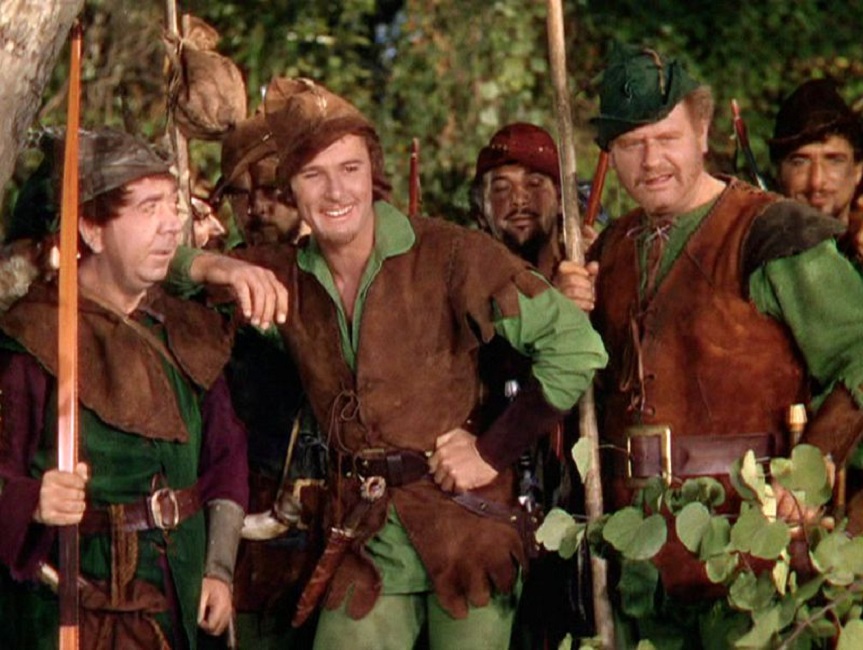  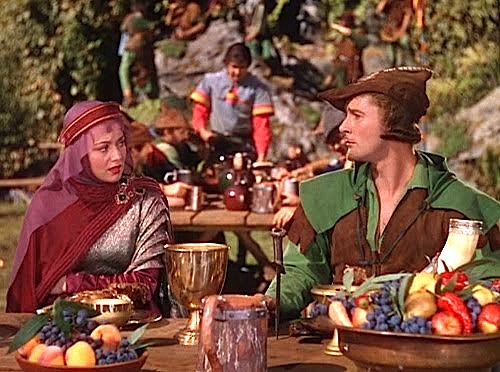 |
|
|
|
Post by kijii on Jul 20, 2018 20:34:37 GMT
Clash by Night (1952) / Fritz Lang
Previously recorded from TCM
This Lang movie, based on an Odets' play, is, to me, something of a MASTERPIECE!!!
This is about the third time I had seen it before realizing its power.
Like Lang's Human Desire (1954), it might be considered a film noir, with Barbara Stanwyck as the femme fatale. On the other hand, it might be capturing human emotions and laying them raw just as naturalism of Zola's novel did.
One of the strongest characterizations of this movie is that of Jerry D'Amato (Paul Douglas). D'Amato is a very good (but very simple) man: he always thinks and expects the best of everyone.
The more I see of Paul Douglas, the better I like him.
The movie might also have a Shakespearean quality to it as well: There is no one as basic as D'Amato; other people around him have urges and desires far beyond his ability to know or believe. But, if Jerry D'Amato is the King Lear of this drama, his Uncle Vince (J. Carrol Naish) is his fool, that makes fun of D'Amato after things go terribly wrong. I can't think of another movie that takes a minor character and shoves the main character's face into the truth as much as D'Amato's freeloading Uncle Vince does. It's almost like Uncle Vince is whispering into D'Amato's ear: "See, I TOLD you so":
Thou wast a pretty fellow when thou hadst no need to care for her frowning. Now thou art an O without a figure. I am better than thou art now: I am a fool, thou art nothing.
[-- King Lear: Act 1, Scene 4,]

Marilyn Monroe and Keith Andes play minor characters in this movie. It's almost as if they are the couple that could have ended up as the Paul Douglas and Barbara Stanwyck characters actually did...  ![]() Of all of the evil characters Robert Ryan played over the years, few could compare to Earl Pfeiffer, the male companion representing an escape from all of Barbara Stanwyck's (Mae Doyle D'Amato's) irresponsible urges: Earl Pfeiffer (Robert Ryan): Love is rotten when it happens like this - the hard way. But we want each other, this is the fire we have to walk through, because this is forever, Mae.
Mae Doyle D'Amato ( Barbara Stanwyck) : Forever?
Earl Pfeiffer : Or until he sticks a knife in me, or you walk out.
Mae Doyle D'Amato : How could I walk out?
Earl Pfeiffer : And do the next thing, get away from here. If you have a dream, live it. If you have a hope, chase it.

Jerry D'Amato (Paul Douglas) : I'm real glad you came back home Mae.
Mae Doyle D'Amato (Barbara Stanwyck) : Why?
Jerry D'Amato : I like you - you know that.
Mae Doyle D'Amato : You don't know anything about me. What kind of an animal am I? Do I have fangs? Do I purr? What jungle am I from? You don't know a thing about me.
 I love the way the dark and foreboding seacoast (with its crashing waves) captures the mood of the movie. I also love the circling birds, ready to swoop down and trap an unsuspecting fish, after it had already been trapped by the fishermen's nets. I love the way the dark and foreboding seacoast (with its crashing waves) captures the mood of the movie. I also love the circling birds, ready to swoop down and trap an unsuspecting fish, after it had already been trapped by the fishermen's nets.
www.youtube.com/watch?v=OSyT2KBNcz4
Here is the full TCM synopsis of the movie with Spoilers:
In a seaside Monterey bar, burly fisherman Jerry D'Amato becomes excited when he bumps into Mae Doyle, a girl from his youth who has just returned home. The sophisticated but unhappy Mae fails to recognize Jerry and goes off to find her younger brother Joe. Joe, who helps Jerry on his boat, is less than pleased by Mae's arrival, even though he has not seen her in ten years. When she admits that she made a mistake by becoming involved with an older man who turned out to be married, however, Joe's attitude softens a little. Joe's girl friend Peggy, who works at the local sardine cannery, is awestruck by the worldly Mae and confides that, like Mae before her, she yearns for excitement and does not want to be bossed around by a man. Later, at the fishing docks, the kind but awkward Jerry asks Joe about Mae's availability, and Joe encourages Jerry to invite her out. During their first date at the local movie theater, Jerry introduces Mae to his best friend, projectionist Earl Pfeiffer. Mae is attracted to the cynical Earl, but dismisses him sharply when he subjects her to a misogynistic tirade about his burlesque dancer wife. Sometime later, while on a night boat ride with Mae, Jerry brings up the subject of marriage, but Mae gently maintains that she is not the "wife type." However, after a disturbing, drunken flirtation with Earl, Mae, who has told Earl that she desires men who make her feel confident and alive, agrees to marry Jerry. At the wedding reception, Earl insists on kissing Mae, and when she resists his ardor, he storms off. Later, after the birth of Jerry and Mae's daughter Gloria, Jerry's freeloading uncle Vince complains that Mae is too controlling and accuses Jerry of being henpecked. That night, the now-divorced Earl shows up at the D'Amatos', drunk, and rants about women and marriage until he passes out in their living room. The next morning, before Jerry leaves for work, Mae surprises him by asking for a goodbye kiss. A hung-over Earl then wakes up and questions Mae about the health of her marriage. Sensing that she has resigned herself to a dull life with Jerry, Earl kisses her forcibly. Mae rebuffs him, but later, after a joyful Peggy comes by the D'Amatos' to announce her engagement to Joe, Earl again kisses Mae, who finally gives in to her passions. Sometime later, Jerry rescues his father from a barroom fight but cannot get the old man to discuss the argument. The vindictive Vince, however, informs Jerry that the town has been gossiping about Mae and Earl and that his father was defending the family name. Angry and indignant, Jerry drives Vince out of his house, then tries to force his father to talk. When Papa again refuses, Jerry searches Mae's things and finds some perfume and lingerie at the bottom of a drawer. As soon as Mae and Earl return to the house, having spent the day together, Jerry confronts them with the items. Mae finally confesses that she is having an affair with Earl but maintains that she was driven to it through boredom and loneliness. Deeply wounded, Jerry calls Mae and Earl "animals" and runs off. Earl advises Mae to leave town with him, but she is reluctant to go until she knows that Jerry is safe. Later, Mae finds Jerry at home and tells him that she is in love with Earl and is running away with him. Jerry tries to change Mae's mind, then screams threats when she reveals that she intends to take Gloria. Terrified of Jerry's wrath, Mae leaves the house without Gloria and goes to Joe's place to pack. While Joe condemns his sister's actions, Peggy offers her sympathy. Still enraged, Jerry, meanwhile, shows up at the movie theater and starts to choke Earl. Mae arrives in time to stop Jerry, who throws her across the room before coming to his senses. Soon after, Mae and Earl return to Jerry's to pick up Gloria, but discover the baby gone. When Papa condemns Mae and refuses to reveal where Jerry took Gloria, Mae starts to have second thoughts about leaving. Unconcerned, Earl insists that they can go without Gloria, prompting Mae to realize that she has spent her entire marriage running away from her responsibilities. Disgusted by Mae's expressions of guilt, Earl announces that he is departing, with or without her. In response, Mae declares that she is taking her chances with her husband and heads for Jerry's boat. There, Mae asks Jerry to forgive her and insists that she has changed. While admitting that he may never be able to trust her, Jerry accepts Mae's apologies and agrees to try again. Jerry then tells Mae that Gloria is asleep on the bunk, and she quietly goes to her baby.
|
|
Deleted
Deleted Member
@Deleted
Posts: 0
Likes:
|
Post by Deleted on Jul 20, 2018 23:03:57 GMT
 Good movie i rate it 7\10 |
|
|
|
Post by petrolino on Jul 21, 2018 0:31:39 GMT
 Good movie i rate it 7\10
Excellent performance by Helena Bonham Carter.
|
|
|
|
Post by Aj_June on Jul 22, 2018 5:18:14 GMT
I just finished watching Val Lewton produced psychological thriller called The Ghost Ship The movie is about a captain who believes in the concept that authority cannot be question. He can go to any extent to prove that to himself. A new officer enters the ship and the conflicts start. I think the movie has problems with character development. The characters are not developed well and some actions taken by certain characters seem abrupt. But overall you can watch one time if you like psychological thrillers. 6/10 The movie is available under public domain . You can see the movie here: free-classic-movies.com/movies-04a/04a-1943-12-24-The-Ghost-Ship/index.php |
|
|
|
Post by OldAussie on Jul 22, 2018 12:51:57 GMT
1st viewing of a pretty famous noir.....  |
|
|
|
Post by Lebowskidoo 💀🎃👻 on Jul 22, 2018 13:45:13 GMT
 Good movie i rate it 7\10 HBC won Best Actress at the 1996 Genie Awards (Canadian Oscars) and much deserved!  |
|
|
|
Post by kijii on Jul 22, 2018 20:30:25 GMT
The Steel Helmet (1951) / Sam Fuller
Previously recorded from a TCM airing
Sam Fuller wrote, directed, and produced this movie, so this is his movie all the way.
This war movie is set during the Korean War. Like many of Fuller's movies, it is unusual in its style--my experience with Sam Fuller has been movies like Pickup on South Street (1953), Shock Corridor (1963) and The Naked Kiss (1964).
Although the story of these soldiers in Korea is centered around one lone sergeant, Sgt. Zack (Gene Evans), it builds and builds into something of an ensemble work with a large variety of American soldiers, a South Korean boy, and a North Korean POW, all gathered into one observation tower (an abandoned Buddhist Temple on a high hill).
Sgt. Zack is a tough cigar-champing soldier who escapes from a POW camp and claws his way to freedom until he is rescued by the South Korean boy, Short Round. [The opening scene of the movie, shows a helmet on the ground, then a hole in the helmet, then the man under the helmet, then the "slanted eyes" of a Asian male who turns out to be the South Korean boy, Short Round.]
Sergeant Zack (Gene Evans): You talk more like a dog face than a gook.
Short Round (William Chun): I am no gook. I am Korean!
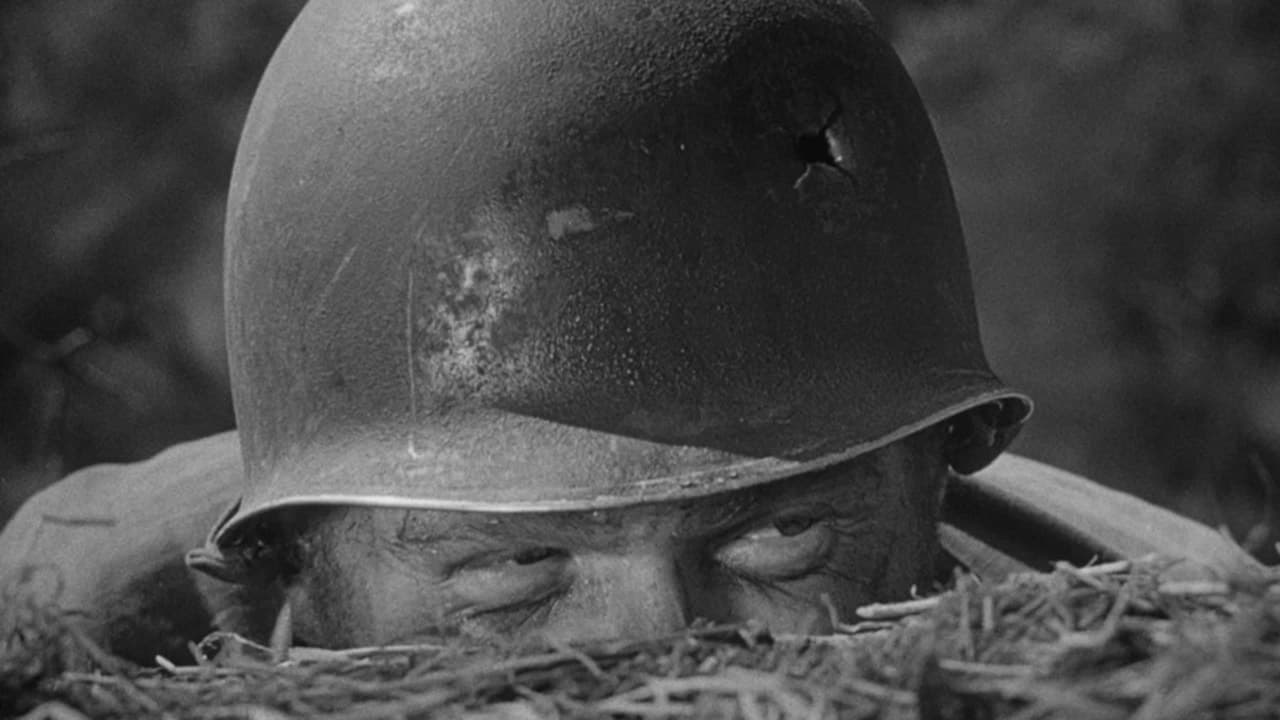
Once rescued, Zack wants nothing to do with Short Round, but Short Round stays with him anyway and gradually wins him over. Other scattered American infantryman soon gather with him until they enter the Buddhist Temple, where they can see a large number of enemy below; the few Americans are FAR outnumbered. Their mission seems to be to radio other American troops and give them the position of the enemy so Americans can attack the superior force of the enemy.
However, the bulk of the movie seems to be dedicated to the interaction of the ragtag group of American stragglers gathered in the Temple. The group includes a commissioned officer (a 90-day wonder), a conscientious objector, a mute, a Negro medic, Cpl. Thompson (James Edwards), and a Japanese-American soldier, Sgt. Tanaka (Richard Loo). All are Americans, but the North Korean POW tries to turn them against each other by playing on the way America as had used their differences during WW II:
The Red (Harold Fong): I just don't understand you. You can't eat with them unless there's a war. Even then, it's difficult. Isn't that so?
Cpl. Thompson (James Edwards): That's right.
The Red : You pay for a ticket, but you even have to sit in the back of a public bus. Isn't that so?
Cpl. Thompson : That's right. A hundred years ago, I couldn't even ride a bus. At least now I can sit in the back. Maybe in fifty years, sit in the middle. Someday even up front. There's some things you just can't rush.
Like Shock Corridor (1963), this movie seems to focus on some societal issues that may make members of the group as diverse as they are united is their overall goal.

Interestingly, when the group first enters the Buddhist Temple, they are told to honor it (as a place of worship) and not destroy any of its religious structures, icons, or artifacts...
By the end of the movie, we realize how paradoxical this order was...

Here is the full TCM synopsis of the movie with Spoilers: Sgt. Zack, a hard-bitten U.S. Army Infantryman battling Communist North Koreans in the Korean War, is the sole survivor of an enemy attack on his regiment. A bullet hole in Zack's helmet serves as a grim reminder that he narrowly escaped death. When the sergeant regains consciousness, he finds a young Korean boy with an M-1 rifle surveying the scene of the massacre. The boy, an orphan from South Korea, whom Zack names "Short Round," wants to be Zack's friend and insists on scouting for him on his search for the enemy lines. Zack is reluctant to let the boy travel with him, but consents to the arrangement until he can deliver Short Round to safety. On their dangerous journey through the war-torn territory, Zack and Short Round come under attack from two Communist guerrilla soldiers disguised as women praying at a religious site. After killing the two guerrillas, Zack and his charge encounter Corp. Thompson, a black medic who is also the sole survivor of a North Korean attack on his platoon. Thompson joins Zack and Short Round and the three continue their search for the front lines. They eventually encounter an American patrol regiment under the command of Lt. Driscoll, whom Zack knows and dislikes. As Driscoll is in need of an experienced soldier to help his patrol set up an observation post at the front, he offers to put aside his differences with Zack and asks him to join his regiment. Zack initially refuses to join the patrol but changes his mind following a sniper attack by Communist guerrillas. Zack continues, however, to hold his opinion that the men in Driscoll's unit are mere amateurs, especially Priv. Baldy, who carries a music box with him, and Priv. Bronte, a conscientious objector in World War II. Soon after Driscoll's unit and Zack's companions set up their observation post at an apparently deserted Buddhist temple, they come under a surprise guerrilla attack. In the ensuing battle, a Communist officer from Manchuria is taken prisoner by Driscoll, who intends to deliver his prized capture to his base. During his captivity at the observation post, the Manchurian officer tells Driscoll's Japanese-American sergeant, Tankaka, that he should be ashamed of his allegiance to a country that interned his people during World War II. Tankaka ignores the prisoner's words, prompting the prisoner to call him a "dirty Jap rat." While Driscoll's unit prepares to clear out of the observation post and return to camp, they are attacked by snipers and Short Round is killed. Motivated by a desire to avenge the boy's death, Zack kills the Manchurian officer in cold blood. The situation looks bad for the Americans, as a large Communist force is making its way to the temple, but they are saved by the arrival of a U.S. Infantry platoon. In the ensuing battle, however, Driscoll is killed and Zack is injured. Following the defeat of the Communists in the battle, the Infantry division escorts Zack, Thompson and the remaining men in Driscoll's unit back to camp.
|
|
|
|
Post by ZolotoyRetriever on Jul 23, 2018 1:25:28 GMT
kijii: I went on a Sam Fuller kick a few years back and watched many of his films - multiple times. I've seen The Steel Helmet a few times, too. If you haven't already done so, check out The Big Red One (1980), with Lee Marvin, for another great Sam Fuller war picture, which is to some extent autobiographical, as Sam Fuller himself actually served in the 1st Infantry Division during World War II.
|
|
|
|
Post by kijii on Jul 23, 2018 5:14:36 GMT
kijii : I went on a Sam Fuller kick a few years back and watched many of his films - multiple times. I've seen The Steel Helmet a few times, too. If you haven't already done so, check out The Big Red One (1980), with Lee Marvin, for another great Sam Fuller war picture, which is to some extent autobiographical, as Sam Fuller himself actually served in the 1st Infantry Division during World War II. : Yes, I think The Big Red One is on my list of movies "to be seen." |
|
|
|
Post by kijii on Jul 24, 2018 1:14:34 GMT
The Big Red One (1980) / Sam FullerRented from Amazon PrimeZolotoyRetriever had suggested I see this movie after seeing my review of The Steel Helmet (1951).He was right. This is a great new movie to add to my viewed movies and, as usual, it is an originally different type of movie.
One might think of it as a biopic of an Army unit--from the end of WWI to the end of WWII.Lee Marvin plays the Sergeant, who had served in WWI. He now leads a squad of men through major maneuvers (planned and unplanned) in which his squad participates in WWII. From the Northern Africa, to Sicily, to the landing on Omaha Beach on D-Day, to the liberation of Belgium, and finally, to the liberation of a concentration camp at the end of the War in Europe. His squad (the 1st Squad) is made up of Pvt. Griff (Mark Hamill), Pvt. Zab (Robert Carradine), Pvt. Vinci (Bobby Di Cicco), and Pvt. Johnson (Kelly Ward) are all "stars" of this group of survivers because they make it through this extended biopic. With each location there is a story, and each story makes up part of the "biography" of The Big Red One as written by Sam Fuller. Each of the stories presents new problems--serious and humorous--to this group of soldiers. This movie is hard to describe. It has to be seen to be understood and appreciated. Great Stuff in an unusual format!!
Griff (Mark Hamill) : I can't murder anybody.
The Sergeant (Lee Marvin): We don't murder; we kill.
Griff : It's the same thing.
The Sergeant : The hell it is, Griff. You don't murder animals; you kill 'em.
 
|
|
|
|
Post by teleadm on Jul 24, 2018 17:46:41 GMT
The Cowboys 1972, directed by Mark Rydell, based on a novel by William Dale Jennings, music by John Williams, starring John Wayne, Roscoe Lee Browne, Bruce Dern, Colleen Dewhurst, Robert Carradine, A Martinez, Slim Pickens and others. Western about aging rancher Will Anderson (Wayne) who is forced to hire inexperienced boys as cowhands, a sudden gold rush nearby makes his usual cowhands to skip town in search of gold, in order to get his herd to market on time but the rough drive is full of dangers and a gang of cattle rustlers is trailing them... Though there are many kids in this movie it's not a family movie, and the hardships are hard and in some cases tragic. John Wayne is very good as an aging rancher pushing 60 and with arthritis, who is hard on the boys in the beginning but as they get better, looses up a bit. Roscoe Lee Browne is around as the one who cares for the movable kitchen, Dewhurt is on for one short sequenze as a madame transporting young girls to the gold rush town. Bruce Dern plays the kind of wierd psycho he did rather often in the seventies, he and his gang has an eye on the heard as they plan to steal it, he actually plays him so wierd one wonders why the rest of the gang just dump him, since he is totally unreliable. The boys are also playing their roles well, and I think they actually was real farmer boys who had to learn to act. Great score by John Williams, that incudes an overture, entr'act and walk out music. Apparently there was some controversy about how the movie solved a problem near the end when one of the main characters died. I liked this movie, but it's nearly 135 minutes and that felt a bit too long. 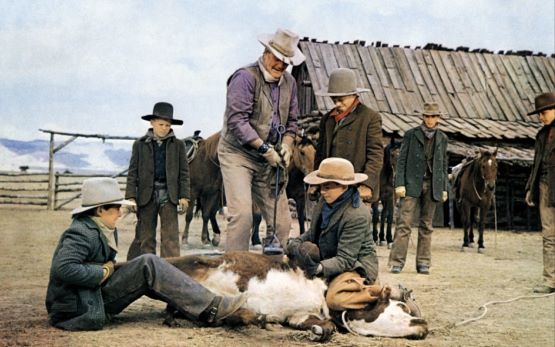  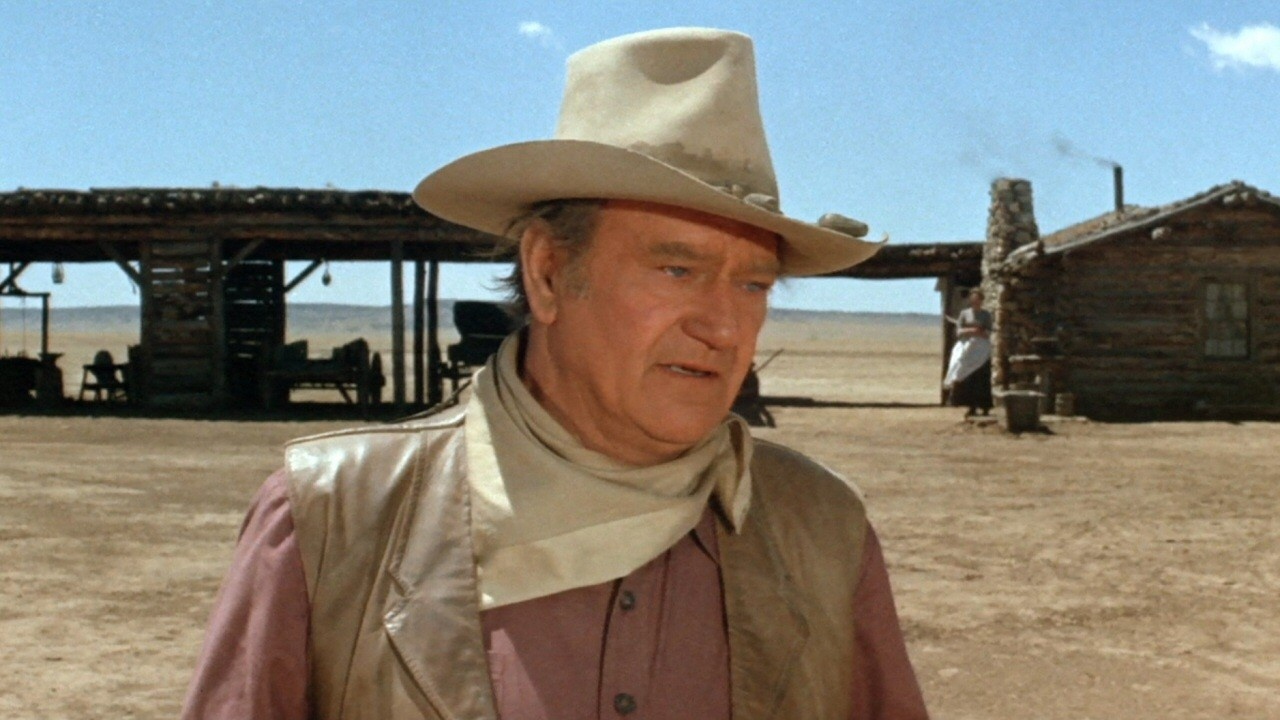
|
|
|
|
Post by jeffersoncody on Jul 25, 2018 4:46:14 GMT
|
|
|
|
Post by teleadm on Jul 25, 2018 18:02:47 GMT
Casino Royale 1967, directed by Val Guest, Ken Hughes, John Huston, Joseph McGrath, Robert Parrish and Richard Talmadge, based on a novel by Ian Fleming, music by Herb Alpert and Burt Bacharach, starring Peter Sellers, Ursula Andress, David Niven, Orson Welles, Joanna Pettet, Daliah Lavi, Woody Allen, Deborah Kerr, William Holden, Charles Boyer, John Huston, Kurt Kasznar, George Raft, Jean-Paul Belmondo, Terence Cooper, Barbara Bouchet and many many others. Love theme "The Look of Love" sung by Dusty Springfield. After the death of M (Huston), Sir James Bond (Niven) is called back out of retirement to stop SMERSH. In order to trick SMERSH and Le Chiffre (Welles), Bond thinks up the ultimate plan. That every agent will be named James Bond. One of the Bonds, whose real name is Evelyn Tremble (Sellers) is sent to take on Le Chiffre in a game of baccarat, but all the Bonds get more than they can handle. I anyone expects some kind of normal movie they will be hughly disappointed, since the whole movie is totally incoherent, characters comes and goes and some suddenly appears again. Sometimes it feels like that there is a plot to follow, just to disappear again, it's more like very expensive set pieces and sequenzes badly edited together with a lot of things gone missing. It was done at a time when Peter Sellers was very uncooperative and unwilling to be funny, and many scenes were never even filmed. It doesn't work as a comedy, parody or thriller, and is a total mess, not helped by having six different directors with their own individual styles. With all it's faults there is still something odd and irresistable about it. Not the economic disaster it's rumoured to be, made at a cost of 12M USD, it bookended in 1967 at 41,7M USD worldwide.   
|
|
|
|
Post by kijii on Jul 26, 2018 5:48:28 GMT
Pal Joey (1957) / George Sidney
Rented for streaming from Amazon Prime
This is one of those movies that I had been avoiding until now. I am not a huge fan of musicals or movies about nightclubs. However, this one is much better than I could have imagined. Frank Sinatra, Rita Hayworth (who got top billing) and Kim Novak form a musical love triangle with Sinatra as the connecting link.
The major songs of this movie, by Richard Rodgers and Lorenz Hart, are well-known and flow naturally from the overall story, based on the original 1940 Broadway Musical Comedy www.ibdb.com/broadway-production/pal-joey-1046:
--There's A Small Hotel
--The Lady is a Tramp
--My Funny Valentine
--I Didn't Know What Time It Was
--I Could Write a Book
--Bewitched, Bothered and Bewildered
PAL JOEY Trailer: www.youtube.com/watch?v=renmTEWSrHQ
Joey Evans (Frank Sinatra): I got it figured out. You treat a dame like a lady, and you treat a lady like a dame.

Vera Simpson (Rita Hayworth): Who's she?
Joey Evans (Frank Sinatra): She's just a mouse.
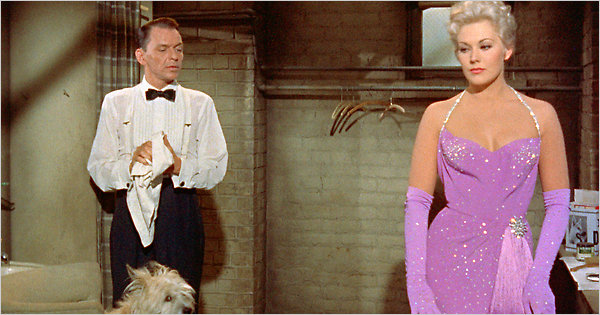
Linda English (Kim Novak): My mother always says a lady's a lady wherever she goes
Joey Evans (Frank Sinatra): And a bum's a bum wherever he goes.


|
|
|
|
Post by Lebowskidoo 💀🎃👻 on Jul 26, 2018 17:37:13 GMT
I Married A Witch (1942), my first time ever seeing a Veronica Lake movie, if you don't count Dead Men Don't Wear Plaid (1982)!  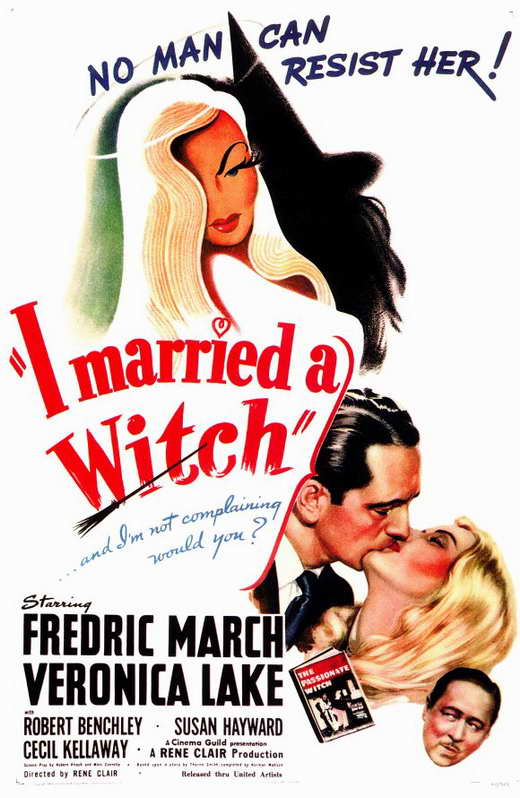
|
|
|
|
Post by teleadm on Jul 26, 2018 17:59:33 GMT
Les diaboliques 1955, directed by Henri-Georges Clouzot, based on a novel by Pierre Boileau and Thomas Narcejac, starring Simone Signoret, Véra Clouzot, Paul Meurisse, Charles Vanel, Jean Brochard, Michel Serrault and others. French chiller thriller drama about the wife (Clouzot) and mistress (Signoret) of a sadistic boarding school headmaster (Meurisse) who plots to kill him. They drown him in a bathtub and dump the body in the school's filthy swimming pool... but when the pool is drained, the body has disappeared and then begins subsequent reported sightings of the headmaster. A retired police commissaire (Vanel) becomes involved and he might see things much clearer than the "killers" and the audience do... I would rather prefer to call this movie a chiller than a horror movie, that it's has been called in my old movie books. Director Clouzot who sometimes can be enervatingly meticulous in his movies that it sometimes can feel that it's too much, avoids that trap this time. The movie starts as a drama, but after the "pefect murder" becomes more like a chiller and a thriller. the plot of disposing the body in the filthy swimming pool, was that the body would eventually float up, and since they had lured him to drink amounts of alcohol, would be concluded as an accident. Vanel's commissaire was discussed on our old site, and that it could be the inspiration of the Columbo character of that American TV-series, I can see some similarities in the cigar chomping, his asking questions that sounds irrelevant and writing down notes in a little notebok. I liked the movie, and it became genuinely eerie once the dead body disappears. I don't want to tell more of the story if there is someone here who hasn't seen it, the movie ends with a text screen commenting on what the viewer has witnessed, and a request not to spoil the ending for those who are planning to see the movie.   
|
|